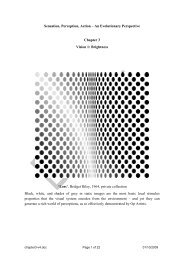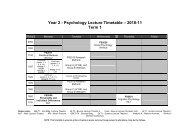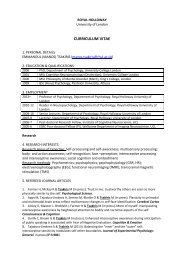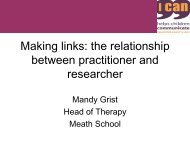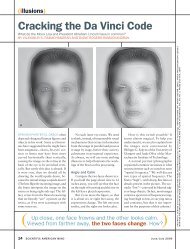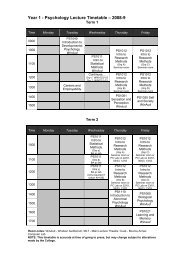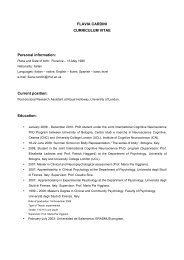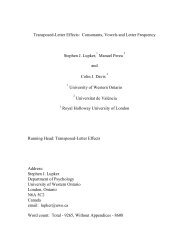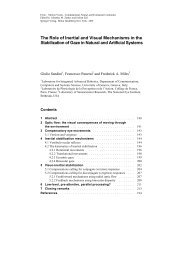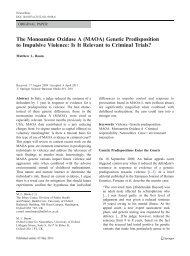Perception as Gateway to the World why are you here ? why do we ...
Perception as Gateway to the World why are you here ? why do we ...
Perception as Gateway to the World why are you here ? why do we ...
- No tags were found...
Create successful ePaper yourself
Turn your PDF publications into a flip-book with our unique Google optimized e-Paper software.
information processing paradigmcentral scientific approach:acquisition, processing, s<strong>to</strong>rage,recall of data in <strong>the</strong> human brain‘ informationprocessing paradigm ’if <strong>you</strong> can build a machine<strong>you</strong> understand <strong>the</strong> underlying processeshis<strong>to</strong>rical development of metaphorsR. Descartes (1644): hydraulic nervesC. Babbage (1832): cogwheel brainModern Neuroscience: IT (v. Neumann, 1958)15/01/2014 PS1061 Sensation & <strong>Perception</strong> #1 JMZ 7some common concerns• perception/cognition/neuroscience is difficult<strong>we</strong> <strong>are</strong> used <strong>to</strong> operate complex machines and understand<strong>the</strong>m - so <strong>why</strong> not looking at <strong>the</strong> brain in action ?• perception/cognition is not a real part of psychologyon <strong>the</strong> contrary - it is fundamental <strong>to</strong> o<strong>the</strong>r disciplines ofpsychology; it provides a solid b<strong>as</strong>is for understanding issuesin social, personality, occupational, health psychology, etc...• perception/cognition/neuroscience is boringit tackles some of <strong>the</strong> most exciting questions of (wo)mankind:how <strong>do</strong> <strong>we</strong> think ? what constitutes <strong>the</strong> human mind ?15/01/2014 PS1061 Sensation & <strong>Perception</strong> #1 JMZ 8<strong>the</strong> workings of a brainso is it difficult ?divide processing in small functional units (components):brain regions that <strong>are</strong> responsible for distinct operations1st mo<strong>to</strong>r <strong>are</strong>a2nd mo<strong>to</strong>r <strong>are</strong>a1st soma<strong>to</strong>sensory <strong>are</strong>a2nd soma<strong>to</strong>sensory <strong>are</strong>apersonality&thinking2nd audi<strong>to</strong>ry <strong>are</strong>amo<strong>to</strong>rsensory2nd visual<strong>are</strong>a1st visual<strong>are</strong>aAlbertus Magnus, 1260functional architectureimaging techniques >> advancefrom speculation <strong>to</strong> hard scientific evidence15/01/2014 PS1061 Sensation & <strong>Perception</strong> #1 JMZ 93
… break …questions ?15/01/2014 PS1061 Sensation & <strong>Perception</strong> #1 JMZ 13<strong>to</strong>ols & resources• lectures ( > attendance recorded
<strong>the</strong> program (order, timing…)1 Introduction: <strong>Perception</strong> <strong>as</strong> <strong>Gateway</strong> <strong>to</strong> <strong>the</strong> <strong>World</strong> JMZ2 Visual <strong>Perception</strong> 1: Learning <strong>to</strong> Read <strong>the</strong> Neural Code SD3 Visual <strong>Perception</strong> 2: Illusions <strong>as</strong> Key <strong>to</strong> Reality JMZ4 Visual <strong>Perception</strong> 3: Traveling through space and time JMZ5 Audi<strong>to</strong>ry <strong>Perception</strong>: From Noise <strong>to</strong> Sound JMZ6 Touch, T<strong>as</strong>te and Smell: B<strong>as</strong>ic but Hidden Senses ? JMZ7 Eye Movements in <strong>Perception</strong> SD8 Attentional Modulation of <strong>Perception</strong> GK9 Multi-sensory Integration SD10 Conceptual frameworks : Making Sense of <strong>the</strong> <strong>World</strong> JMZ15/01/2014 PS1061 Sensation & <strong>Perception</strong> #1 JMZ 16<strong>why</strong> is reliable information vital ?<strong>we</strong> need <strong>to</strong> operate and navigate ina dangerous world“ … think bike … see/hear/smell <strong>the</strong> bike ! “<strong>we</strong> need ‘intelligence’ <strong>to</strong> understand<strong>the</strong> world (‘make sense’)“… while a small number of old,aban<strong>do</strong>ned chemical munitions have beendiscovered, ISG judges that Iraqunilaterally destroyed its undecl<strong>are</strong>dchemical <strong>we</strong>apons s<strong>to</strong>ckpile in 1991”sensory information processing is incessant and effortless: Data Mining15/01/2014 PS1061 Sensation & <strong>Perception</strong> #1 JMZ 17when things go wrong: from <strong>the</strong> BBChave a look at some examples …http://www.bbc.co.uk/science/humanbody/tv/humansenses/15/01/2014 PS1061 Sensation & <strong>Perception</strong> #1 JMZ 186
perception = collecting informationinformation needs <strong>to</strong> be collected & sorted (processed)• what is relevant ?• what is urgent ?• what can be ignored ?bottleneck :channel capacity(l/min, bps)filter :channel tuning(size, frequency)b<strong>as</strong>ic ‘engineering’ concept: filtering15/01/2014 PS1061 Sensation & <strong>Perception</strong> #1 JMZ 19how many senses <strong>do</strong> <strong>we</strong> have ?(input channels for Computer: informationcan be entered through keyboard, camera,microphone, modem, ...)Aris<strong>to</strong>tle (384 –322 BC): animals must haveperception if <strong>the</strong>y <strong>are</strong> <strong>to</strong> liveFIVE SENSES : sight, hearing, <strong>to</strong>uch,smell, t<strong>as</strong>tePLUS : temperature ? pain ? balance ?OTHER : magne<strong>to</strong>reception ? electroception ? ultr<strong>as</strong>ound ?‘sensory modalities’15/01/2014 PS1061 Sensation & <strong>Perception</strong> #1 JMZ 20(modality) channel 1 : smellolfac<strong>to</strong>ry perception (L 6)is a very b<strong>as</strong>ic sensory systemwhich is often forgottenit helps us <strong>to</strong> find our waythrough a complex anddangerous world, and iscrucial for our <strong>we</strong>ll-being andemotional balanceolfac<strong>to</strong>rybulbolfac<strong>to</strong>ryrecep<strong>to</strong>rsolfac<strong>to</strong>rymucusn<strong>as</strong>alcavityolfac<strong>to</strong>rytract15/01/2014 PS1061 Sensation & <strong>Perception</strong> #1 JMZ 217
(modality) channel 2 : <strong>to</strong>uchsoma<strong>to</strong>sensory perception (L6)is essential for maintaining <strong>the</strong>integrity of <strong>the</strong> body, forcontrolling movements, etc.phan<strong>to</strong>m sensationsdemonstrate <strong>the</strong> hidden butcontinuous operation of <strong>the</strong>soma<strong>to</strong>sensory system - <strong>do</strong> <strong>you</strong>feel <strong>the</strong> gl<strong>as</strong>ses on <strong>you</strong>r nose?cortical representation:body maplipsgumsjawthumbeyenoseface<strong>to</strong>ngueab<strong>do</strong>menfingershandforearmelbowarmheadtrunkneckhipleglips15/01/2014 PS1061 Sensation & <strong>Perception</strong> #1 JMZ 22(modality) channel 3 : hearing<strong>the</strong> ear is <strong>the</strong> intelligentmicrophone of <strong>the</strong> brainit captures a wide range ofacoustic informationaudi<strong>to</strong>ry perception (L 5)mediates : orientation,relaxation, stress,communicationpinn<strong>as</strong>oundtympanicmembraneoval win<strong>do</strong>wmalleusincusstapesrhythmvestibularapperatuscochlear nervecochlealanguageemotion15/01/2014 PS1061 Sensation & <strong>Perception</strong> #1 JMZ 23(modality) channel 4 : seeingvisual perception (L 2, 3, 4)is often regarded <strong>as</strong> <strong>the</strong> most important of <strong>the</strong> senses, because it isan immediate and very rich source of informationvisual fieldleft eyeoptic chi<strong>as</strong>mleft hemisp<strong>here</strong>visual fieldright eyeoptic nerveoptic tractLGNoptic radiationright hemisp<strong>here</strong>neural imagelarge channel capacity !!!• 100 millionrecep<strong>to</strong>rs per retina• 1 million nervefibres per eye• 30 brain <strong>are</strong><strong>as</strong>• 20% of brain• 10 billion corticalneurons15/01/2014 PS1061 Sensation & <strong>Perception</strong> #1 JMZ 248
summary• studying sensation & perception, <strong>to</strong>ge<strong>the</strong>r with cognitive psychology is par<strong>to</strong>f a multidisciplinary attempt <strong>to</strong> study <strong>the</strong> human mind : how <strong>do</strong> <strong>we</strong> think ?• <strong>the</strong> central scientific paradigm is <strong>the</strong> information processing approach : <strong>the</strong>brain is interpreted <strong>as</strong> a computer dealing with huge & complex data sets• perceptual processes <strong>are</strong> required <strong>as</strong> input for <strong>the</strong> neuronal machinery –which is absolutely crucial for a wide range of vital functions• perception is both a bottleneck reducing <strong>the</strong> amount information and afilter selecting relevant information - <strong>we</strong> speak of channels, tuning, capacityhttp://www.pc.rhul.ac.uk/staff/J.Zanker/PS1061/L1/PS1061_1.htmsee also Chapter 1 of Zanker 2010and Koch, Nature 411, 893 (June 2001)15/01/2014 PS1061 Sensation & <strong>Perception</strong> #1 JMZ 25…questions???15/01/2014 PS1061 Sensation & <strong>Perception</strong> #1 JMZ 26… have a nice rest-of-<strong>we</strong>ek!15/01/2014 PS1061 Sensation & <strong>Perception</strong> #1 JMZ 279



